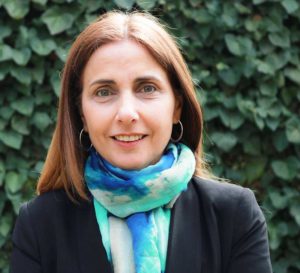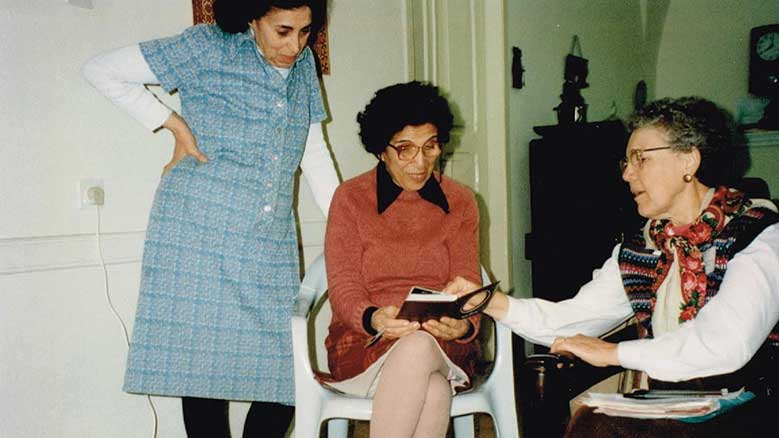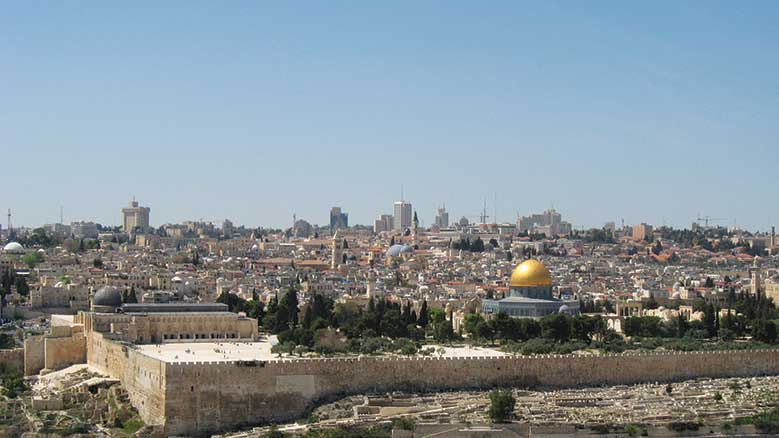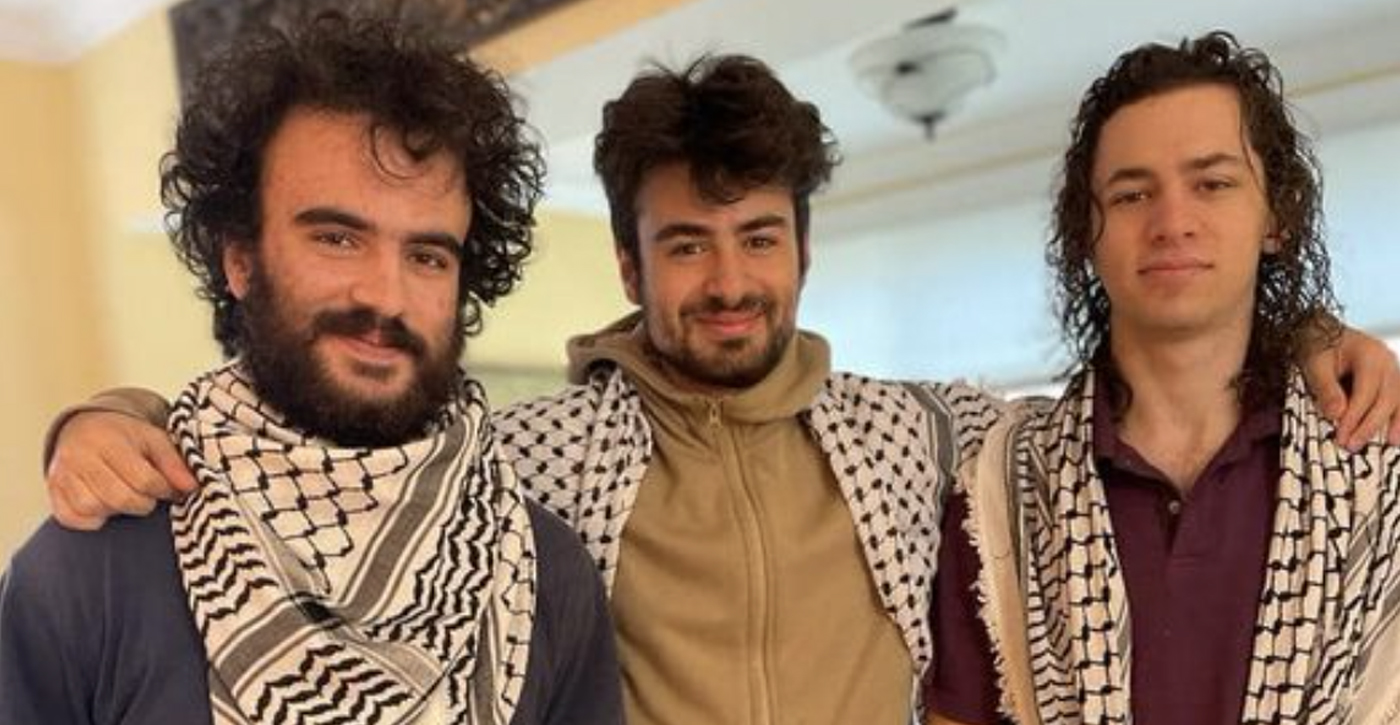
Much of your life and the life of your extended family has been tied to Ramallah Friends School in Palestine. Tell us some of the roles you’ve had there.
The Ramallah Friends School has not only been part of my own personal life, but also that of my extended family. My grandmother, who is of Greek Orthodox faith, was convinced of Quakerism in the 1920s—when the Quaker missionaries were in Ramallah to help establish the school. My grandmother is a graduate of the school, along with my mother (my father attended but then left for the United States), my husband, my children, and my siblings.
I graduated from Ramallah Friends School in 1983. When I returned from my college university education in the United States, I briefly worked there as a teacher of computer science, until the start of the First Intifada, when the Israelis closed down all of schools, including the Ramallah Friends School. Later, in 2003, I became involved with the parent-teacher association, but was soon offered the position to become the school director. My family decided to relocate to the United States for personal reasons five years ago, and since then I’ve been managing Ramallah Friends School from abroad.
What led you to apply for the general secretary position at AFSC?
Five years is a little bit too much of this commuting and managing from a distance. I thought I need to consider other options; when the general secretary position for American Friends Service Committee was made known to me, I was wowed with the possibility.
I took some time to discern whether I wanted to apply, knowing very well that it would be all-encompassing work. Before working with the Ramallah Friends School, I worked for various international development organizations. I worked for the United Nations and Oxfam Great Britain (I was the country director for Israel and Palestine), and was privileged to have contributed to the programming that empowered and transformed the lives of communities. My interest to and commitment for social justice programs is amplified with having lived through a horrific and continuing injustice in Palestine, and also after seeing the present social and political turmoil taking place in the United States.
There are some surprising similarities between a Quaker school and AFSC. Both are very visible, public institutions largely staffed by and largely serving non-Quakers.
Both AFSC and Ramallah Friends School are grounded in a foundation of Quaker values and testimonies and have impressive histories. Without that foundation, the school may not have continued to exist for 148 years of war and regional turmoil. To be spiritually led is imperative when the aim is to transform lives. AFSC carries a similar history of transformation and has likewise succeeded through the power of love. I have already received several messages from well-wishers telling me that their years at AFSC were “the best years of their lives.”
The people who work for AFSC are some of the most passionate and self-inspired people I’ve ever met. If we follow the messages of Margaret Benefiel in her book Soul at Work, we know that passion is the one ingredient that will improve morale, increase productivity, and create harmony among all parts of the organization. AFSC struck me as a place that has made many strides in this regard, and I look forward to encouraging people to bring their souls into the workplace.
As someone who has lived through horrific injustice and violence myself, I am able to draw the parallels and appreciate the complexity and intersectionality of the social justice issues that are very important in AFSC’s work in the United States and internationally.
What are some of the values that we have to share with the world?
Our values are universal, and we should not claim ownership to them. We have a responsibility to put our values to work; Friends do this exceptionally well. The continuous seeking of that of God in our surroundings prepares our minds to consider other truths. It commits us to Spirit-led service and action and solid convictions on issues and principles. I think that’s a great combination.
Our school in Palestine is known as a Quaker school. We articulate our values regularly. We talk about tolerance, service, equality, and simplicity, but I don’t think this is what matters the most. It is how we translate these words in our decision making and in our relationships. For example, Ramallah Friends School is the only inclusive education school in Palestine offering children with special needs an opportunity that is otherwise absent there. While this comes with a financial cost, we test our value of equality as we ensure that our program leaves no one behind.
The Arab world, for the most part, can be very hierarchical and authoritarian, where the leader is expected to independently make all decisions. We offer another model by saying, “No, it’s really by consultation and consensus that we reach conclusions.” We show Quaker values at work by modeling the way.
This is also very apparent in the work of AFSC. Last year AFSC commissioned an independent report to assess structural racism within AFSC. I thought that this presents a compelling case of AFSC practicing what it preaches. AFSC is not shying away from courageously addressing these matters; they are stating that they are not immune. This gives me a sense that this an organization that is genuine about putting Quaker values into practice.
AFSC has been reinventing itself since its founding 100 years ago. What are some of the particular challenges of Quaker witness today?
To me, challenges are opportunities, always. Change and reinvention is inevitable for any organization. In both the United States and the world we’re seeing dramatic global shifts, whether it’s Brexit or a Trump victory or the emergence of ISIS—all disheartening, social, economic trends that are reminders of the emergence of a grave reality that requires our immediate attention. That to me is a challenge, but it’s also an opportunity: How can we build on our exciting work and partnership, urgently and creatively, in a manner that can make a difference?
I think we’ve learned from this last U.S. election that we need to listen more. This can often be a challenge for people who are very passionate about the positions they take. Sometimes the passion is so overwhelming that it sort of overrides that willingness to listen to other narratives. This is something that we really need to work much harder on. Truth is always incomplete. We always have to look for other truths. We need to break through some of these boundaries that we’ve put around ourselves and seek a wider spectrum of perspectives.
We know that racial and political and economic divides are on the rise, but we also need to keep the hope alive. We read a lot about things that make us angry, but there are also stories that make us proud. Humanity is still alive and well. We need to make sure that people hear not only about the atrocities and the detrimental executive orders, but also about the communities which are coming together to make a difference and effect change that we all seek.
How would you like to see Friends more involved with AFSC? How can we support its work?
I haven’t started in the position of course, but it’s been clear to me that AFSC puts significant effort into presenting opportunities for engagement, whether connecting with a campaign or hosting an event. The website has a “Get Involved” page that is immensely resourceful with many ideas, including a Quaker social change ministry and a “Let Your Life Speak” booklet. I’ve been impressed that AFSC has a director of Friends relations, Lucy Duncan, who is doing a terrific job forging these connections.
I know that there are divides and that not all Quakers and Friends will have the same views on social justice issues. Some Friends may not agree with a direction that an AFSC program is taking. Tensions will arise. This is not unique to Friends. As the director of Ramallah Friends School, I have enjoyed building partnerships with Quaker communities across the United States and increasing their social consciousness and commitment to social justice and awareness of the need for humanitarian support and political solidarity with Palestinians. I think my work may have helped to ameliorate some of the racism against Arabs found within some individuals in the United States.
I am hoping I can take that experience to Quaker communities and manage similar successes on issues of priority for AFSC. We can engage Friends in meaningful dialogue on social justice issues like Black Lives Matter or immigration reform or LGBTQ rights. These are conversations that I tremendously enjoy taking part in. I look forward to helping build bridges by delving into these conversations on behalf of AFSC.






I met Joyce at an earlier time this past year and was pleased to know of her connection with Ramallah Friends School (RFS). In March of 2015, I was part of a group of Quaker school connected adults who spent about two weeks in Palestine and Israel … for me a heart wrenching experience seeing how Palestinians are treated by Israelis. The time at RFS was good because I learned how persistence in the face of suppression can triumph. So it’s great that Joyce Ajlouni will be heading the AFSC. I’ve been a volunteer and fan of that organization since 1954.
Excellent